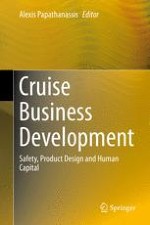2016 | OriginalPaper | Buchkapitel
3. ‘Stranded at Sea’: Exploring Passengers’ Reactions During Incidents at Sea
verfasst von : Alexis Papathanassis
Erschienen in: Cruise Business Development
Aktivieren Sie unsere intelligente Suche, um passende Fachinhalte oder Patente zu finden.
Wählen Sie Textabschnitte aus um mit Künstlicher Intelligenz passenden Patente zu finden. powered by
Markieren Sie Textabschnitte, um KI-gestützt weitere passende Inhalte zu finden. powered by
